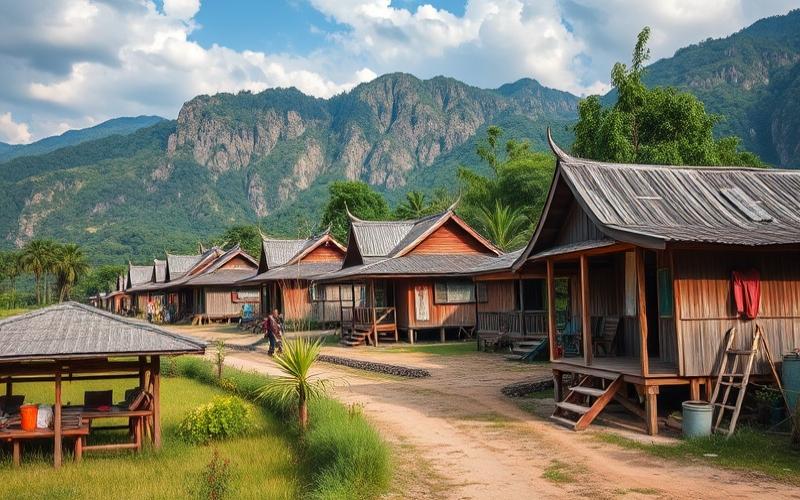
 Published on and written by Cyril Jarnias
Published on and written by Cyril Jarnias
Thailand, with its paradise beaches, rich culture, and legendary hospitality, attracts millions of visitors from around the world each year. This constant tourist flow has a significant impact on the country’s real estate market, creating opportunities but also challenges for investors and local residents. Let’s explore in detail how tourism shapes the Thai real estate landscape.
Thailand’s Tourist Gems: Buzzing Real Estate Hotspots
Tourism in Thailand primarily concentrates in certain key regions, which have become true magnets for real estate investors. These popular tourist areas have experienced spectacular real estate development in recent years.
Bangkok, the vibrant capital, attracts both tourists and real estate investors. The city is experiencing a construction boom of luxury condominiums and ultra-modern shopping centers. Neighborhoods like Sukhumvit, Silom, and Sathorn are particularly sought after for their proximity to tourist attractions and transportation infrastructure.
Phuket, the pearl of the Andaman Sea, is a prime destination for real estate investors. The island has seen the development of numerous hotel complexes and luxury residences, especially along its most famous beaches like Patong, Kata, and Karon. Sea-view villas are particularly sought after by foreign investors.
Koh Samui, the tropical island, has experienced significant real estate development in recent years. Areas like Chaweng and Lamai Beach have become real estate investment hubs, with the construction of many luxury villas and high-end hotel complexes.
Pattaya, the lively beach resort, attracts many real estate investors due to its proximity to Bangkok and festive atmosphere. The city has seen a multiplication of condominium projects, particularly along Jomtien Beach and in the city center.
Chiang Mai, the rose of the North, is also experiencing tourism-related real estate growth. The city attracts an increasing number of expatriates and foreign retirees, which stimulates demand for quality housing in neighborhoods like Nimman and the historic center.
These popular tourist areas have seen their urban landscapes transform rapidly to meet growing demand for housing and tourist infrastructure. This evolution has had significant repercussions on the local real estate market.
Good to know:
Real estate investors should be aware of local regulations concerning foreign property ownership in Thailand. In most cases, foreigners cannot directly own land but can purchase apartments in condominium buildings.
Soaring Prices: When Tourism Drives Up Real Estate Values
The constant influx of tourists and foreign investors has had a significant impact on real estate prices in Thailand’s popular tourist areas. This upward trend has been observed for several years and appears to continue despite global economic fluctuations.
A steady price increase
According to data from the Bank of Thailand Housing Price Index, residential real estate prices in major tourist areas have seen an average annual increase of 5-7% over the past five years. This rise is particularly marked in coastal regions like Phuket and Koh Samui, where demand for luxury properties with sea views remains strong.
In Bangkok, condominium prices in tourist-favored neighborhoods like Sukhumvit have increased by nearly 30% since 2020. This trend is explained by growing demand for short-term housing from tourists and expatriates.
Regional disparities
It’s important to note that tourism’s impact on real estate prices is not uniform across the country. While tourist areas experience high real estate inflation, regions less frequented by foreign visitors have seen more moderate price increases.
For example, in Chiang Mai, although the city attracts increasing numbers of tourists and expatriates, real estate price increases have been more moderate, with an average annual rise of 3-4%. This difference is partly explained by a larger real estate supply and lower construction costs compared to coastal regions.
Impact on the rental market
Rising real estate prices have also had repercussions on the rental market. In popular tourist areas, rents have increased significantly, sometimes making housing access difficult for the local population.
In Phuket, for example, apartment rents in tourist-favored areas have increased by nearly 20% since 2020. This trend has pushed many local residents to settle in neighborhoods further from tourist centers.
Challenges for housing affordability
The rapid increase in real estate prices in tourist areas poses challenges in terms of housing affordability for the local population. Thai authorities are increasingly aware of this problem and are beginning to implement measures to encourage affordable housing construction in these regions.
Good to know:
Despite rising prices, real estate in Thailand remains relatively affordable compared to other popular tourist destinations in Southeast Asia. However, investors should remain vigilant about market fluctuations and local regulations.
The Rental Investment Boom: When Tourists Become Tenants
The tourism boom in Thailand has created a flourishing market for rental investment, particularly in popular tourist areas. Many investors, both local and foreign, have seized this opportunity to acquire properties intended for short-term rental.
The rise of vacation rentals
Online rental platforms like Airbnb have revolutionized the short-term rental market in Thailand. According to AirDNA data, the number of accommodations listed on Airbnb in major Thai tourist destinations increased by over 150% between 2020 and 2024.
In Phuket, for example, it’s estimated that nearly 20% of apartments and villas are now used for short-term tourist rentals. This trend has created a new category of real estate investors who purchase properties specifically to rent them on these platforms.
Attractive rental yields
Rental investment in Thai tourist areas can offer attractive returns. According to CBRE Thailand data, gross rental yields for well-located apartments in Bangkok can reach 5-7% annually. In beach destinations like Phuket or Koh Samui, these yields can even exceed 8% for well-managed luxury properties.
These figures attract many foreign investors, particularly from neighboring countries like China, Hong Kong, and Singapore. However, it’s important to note that these yields can fluctuate depending on tourist seasonality and overall economic conditions.
Impact on the long-term rental market
The tourist rental investment boom has had repercussions on the long-term rental market in some regions. In highly touristic areas, there’s a decrease in available housing supply for long-term rental, which can create problems for local residents and expatriates.
In Bangkok, for example, some neighborhoods popular with tourists like Sukhumvit have seen a significant increase in long-term lease rents, partly due to competition with short-term rentals.
Regulatory challenges
The rapid rise of vacation rentals has also raised regulatory questions. The Thai government has begun implementing stricter regulations to govern this activity, particularly regarding tax reporting and safety standards.
In 2024, new regulations were introduced requiring all owners offering short-term rentals to obtain a specific license and comply with certain quality standards. These measures aim to professionalize the sector and protect consumers.
Future prospects
Despite these challenges, tourist rental investment in Thailand remains attractive to many investors. The post-pandemic tourism recovery and government efforts to diversify the country’s tourist offerings suggest good prospects for this sector.
However, investors must remain vigilant about regulatory developments and tourist market fluctuations. Professional management and a flexible rental strategy are essential for success in this field.
Good to know:
Foreign investors interested in rental investment in Thailand must be aware of legal restrictions on foreign ownership. It’s often necessary to use specific legal structures or partner with local partners to invest in Thai real estate.
The impact of tourism on Thailand’s real estate market is undeniable. From popular tourist areas attracting investors to soaring prices in certain regions, and the rental investment boom, the Thai real estate sector is deeply influenced by the tourism industry.
This dynamic offers numerous opportunities for savvy investors but also presents challenges in terms of housing affordability for the local population and market regulation. In the future, the balance between tourism development and local population needs will be crucial to ensure sustainable real estate development in Thailand.
As the country continues to attract millions of visitors each year, the Thai real estate market will undoubtedly remain a dynamic and constantly evolving sector, reflecting global tourism trends and the aspirations of a new generation of investors and travelers.
Disclaimer: The information provided on this website is for informational purposes only and does not constitute financial, legal, or professional advice. We encourage you to consult qualified experts before making any investment, real estate, or expatriation decisions. Although we strive to maintain up-to-date and accurate information, we do not guarantee the completeness, accuracy, or timeliness of the proposed content. As investment and expatriation involve risks, we disclaim any liability for potential losses or damages arising from the use of this site. Your use of this site confirms your acceptance of these terms and your understanding of the associated risks.



















































